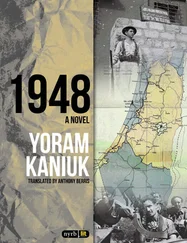The hotel was in turmoil. Jews who wanted to board the ship honking in the harbor sought buyers for their miserable belongings. Arabs haggled cunningly and the dignitaries among them would spit at every Jew heading for the ship, and Nehemiah, who was watching his wife's face, didn't see the Jewish lords wearing suits and smelling of perfume who came to take care of the new immigrants, to arrange their papers, if they had any, and talked with the Pioneers as if they were recalcitrant children who came to embitter their lives. Nehemiah said to Rebecca: I swear to you, Rebecca, I've come home and I won't leave here. And she, who longed with all her soul to leave here, was too stunned by the solemnity of his words to respond. She thought: I've got his son in my belly, he'll learn. From the window, on the other side of the room, a little square was seen with a carousel spun by a donkey and a camel. An Egyptian dancer in red and bright scarves danced there to the cheers of mustached men who cheered and applauded and thrust money between her breasts. Her eyes were painted, and even from the window they looked bold. The donkey spinning the carousel with the camel stopped, and a man in the uniform of a retired emperor whipped him and cursed in Italian. At night, they put into Nehemiah's coffin the body of the man who died of typhus, Rebecca took from her trunk a black silk dress and a black silk scarf, and the next day she went to the funeral with a sweet expression of modesty steeped with charm on her face.
The tears she had wanted to weep the day before now flowed, cultivated, proper, and foreign to her. They were meant for a man she didn't even know, and another man she didn't even know praised Nehemiah, a cantor recited the prayer for the dead and somebody volunteered to say kaddish. The Turk who stood there all the time and stared at Rebecca wanted them to put up a tombstone immediately. And the tombstone was ready that very day with the engraving: Nehemiah ben Moshe Isaac Schneerson, born in Ukraine in 1880, buried in the Land of Israel in the month of Teveth 5660 (1900). The Love of Zion Burns in his Heart. The Turk asked the translator to translate for him. The translator read: "Nehemiah Schneerson born in Russia in the year eighteen eighty, buried in Palestine in the month of January nineteen hundred. The love of his wife will accompany him." Rebecca whispered to the Jew in the white suit: What is he saying, and he translated for her. She said, Why did he say Russia, and the Jew said: For him, Ashkenazi Jews are born only in Russia, for the Turk it's all the same, anyway he doesn't know where that is. The Turk smiled, received what was coming to him, and left. Later on, what was written would be corrected and the document signed by two rabbis along with the photo of the grave against the background of the Mount of Olives would be sent to the family of the dead man in Aleppo, Syria.
Nehemiah wasn't thrilled by the sight of Mr. Abravanel, who came to talk with him in the locked hotel room about the wretched settlements. An empty suit, he said to Rebecca who made tea and served them. A pleasant wind blew from the sea. Nehemiah wanted to go immediately. Rebecca wasn't thrilled, but the hotel wasn't her heart's delight either and so it was decided to leave the next night. Mr. Abravanel, whose son would rule Israel after those ragamuffins, arranged everything and the next day a cart waited for them at the door of the hotel. Nobody peeped out the windows. The streets were dark. The Turks were already beating one another in their dark rooms. The cold of the night before vanished in a dry chill. A wind blew from the Libyan deserts. A precarious smell of cardamom, raisins, and droppings rose in Rebecca's nose. Nehemiah smelled lemons and honey. The road was deserted and the sky was strewn with stars.
On the day Nehemiah and Rebecca came to Jaffa, the settlements were transferred from Baron Rothschild to the IKA Company. The settlers knew the new company wouldn't soon fire the staff. The carter who brought Nehemiah and Rebecca said: It'll be bad! Everything will go down the drain, and Rebecca asked him what could go down the drain and he didn't answer, but cursed his horses.
Despite the worry, Nehemiah felt a quiet bliss. In the shadows of the mountains in the distance, he saw the sights of his childhood, the carter began singing melodies and one of them was Joseph Rayna's sad song about the rivers of the Land of Israel going to the Temple to ask forgiveness. Nehemiah longed for his wife, touched her belly, and said: That son, let it be mine! And Rebecca, who knew what he wanted to ask, didn't say a thing.
By morning, the jackals' wailing stopped and a clear blue light began filling the world. Nehemiah didn't shut his eyes and Rebecca dozed off. In the distance, as on a saccharine color postcard, the Arab village of Marar was seen, all of it like a beehive. Dogs barked and a smell of droppings and sweet basil rose from the village turned by the sun now rising fast into a kind of ruined ancient city. Later, the heat intensified with the eastern wind from the desert, and a struggle of forces raged between winter and the hot wind and when they passed by some fig trees and sycamores, the sun already blinding their eyes, the settlement emerged in the distance. A few neglected and cracking houses, fleeing, maybe eluding, thought Rebecca, limestone fence trying to unite the houses into one block, a few young trees, and some desolation that wasn't created or dissolved. The heat was heavy now and Rebecca felt dizzy.
Nathan, Nehemiah's old friend, rode up on a white mare and even in the distance he hugged the image of Nehemiah in his empty arms. Nehemiah roared with joy at him. Rebecca was amazed and said: At night he learned to talk with wolves? And the carter said to her, Those are jackals, Madam, not wolves, and she said: Jackals, wolves, same pest. When they came to what Nathan called the center of the settlement and what Rebecca privately called that miserable hole, the sun was beating down with its full force. Near the synagogue, whose second story was still under construction, stood the miserable-looking men who were trying in vain to stand proudly. Nathan, who used to sit with Nehemiah in the forest and was his teacher before he ascended to the Land of Israel four years earlier, was wearing a dusty beret and his face was seared by the sun. He hugged Nehemiah, looked at Rebecca, and a forgotten smile rose up and crept over his lips. The people whose clothes looked to Rebecca as if they belonged to another climate surrounded them, there was great excitement, for some reason everybody thought that what had been broken in those years would be fixed with Nehemiah's coming, that his good sense and integrity were a hope they had cherished for days and nights. They said: Everything here is sold to the Baron, but we won't be dependent on his charity. Nehemiah smiled, some of the men he knew, others he knew only by rumor, their letters he had read several times, moldy water flowed along the ditch where they stood, Nehemiah thought of Abner ben-Ner and his heroes, and saw Arab children, barefoot, splashing in the moldy water, dragging piles of straw on their backs. A pesky buzzing of flies struck his ears but he tried not to hear. Nathan said: Soon our community will be blessed, and riots of agreement rose from mouths that were parts of faces that tried to adorn the moment with a smile that was stuck years ago to old valises. The young vineyards, crests of trees that were planted, and the limestone wall touching the houses, everything made Rebecca clearly suspicious. Nathan took off his shoes, looked at his old friend, and in the blinding light that had no corners, no ends, struck by a hot wind sharp as a razor, he started dancing with his arms spread out to the sides, and everybody stood as if they were turned to stone. The carter unhitched his horses and gave them something to chew from the crib, and Nathan, (very) isolated now, danced with a slow, hesitant movement as if he were groping in an invisible space, with his eyes shut, with great devotion, and Nehemiah put his coat on the ground, took off his shoes, too, and with the devotion of Hasids standing on the roof and yelling The Lord is God, he hugged Nathan and together they danced while everybody looked at them without budging.
Читать дальше












